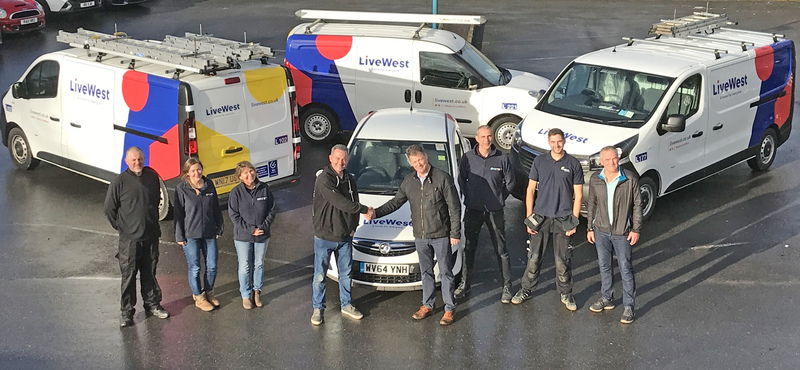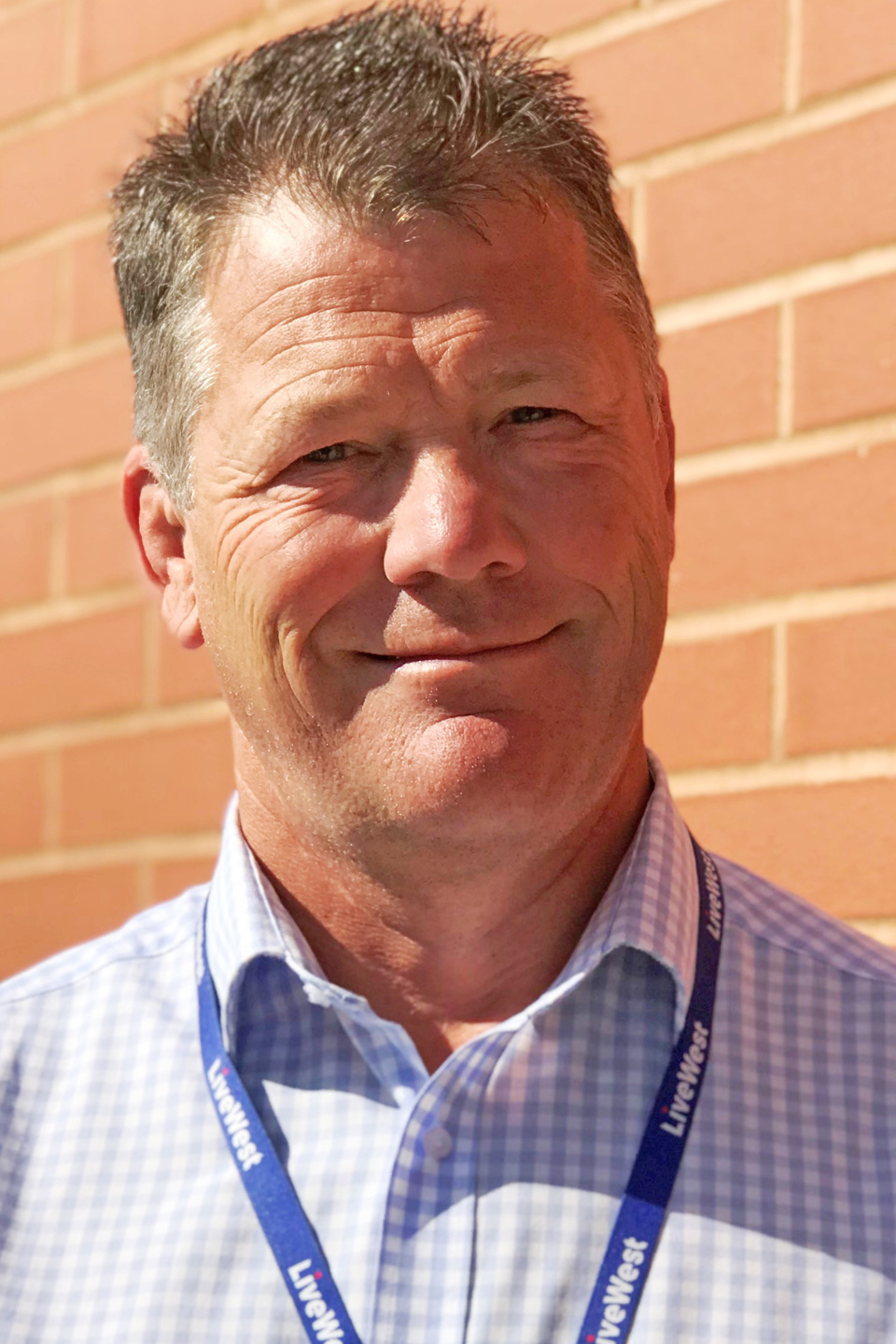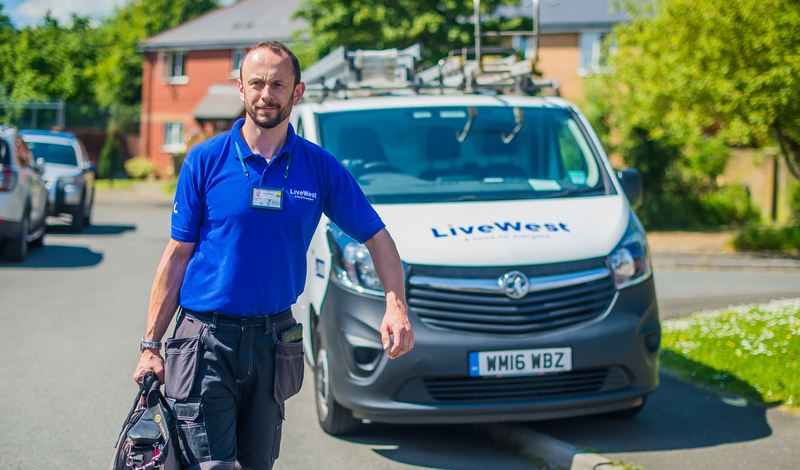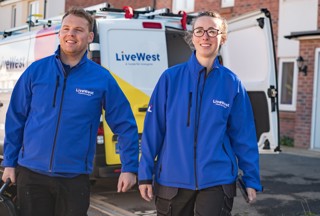Vehicles are in Paul Ayris’s blood. His father owned HGVs, so, since a young age, he has been around the yard environment.
It was no surprise, then, when he entered the haulage sector, working for several businesses before setting up his own company.
“When it’s your money, that really focuses your mind on cost savings,” Ayris says. It was the ideal foundation for a career in fleet management.
The move from haulage to fleet began with a four-month contract managing a fleet of 120 vans for LiveWest. As the housing association entered a growth phase, bringing many outsourced projects in-house, Ayris was asked to be part of the journey.
That was eight years ago.
Following a merger with another housing association two years ago, the fleet has grown to 383 light commercial vehicles (LCVs), from car-derived vans to 3.5-tonne panel vans, including some tail-lift tippers.
All are purchased outright, giving the organisation the same level of flexibility and control it enjoys across its business interests.
Telematics monitoring and targeted driver solutions help Paul Ayris to halve incident rates and damage costs over 12 months.
Vehicles are in Paul Ayris’s blood. His father owned HGVs, so, since a young age, he has been around the yard environment.
It was no surprise, then, when he entered the haulage sector, working for several businesses before setting up his own company.
“When it’s your money, that really focuses your mind on cost savings,” Ayris says. It was the ideal foundation for a career in fleet management.
The move from haulage to fleet began with a four-month contract managing a fleet of 120 vans for LiveWest. As the housing association entered a growth phase, bringing many outsourced projects in-house, Ayris was asked to be part of the journey.
That was eight years ago.
Following a merger with another housing association two years ago, the fleet has grown to 383 light commercial vehicles (LCVs), from car-derived vans to 3.5-tonne panel vans, including some tail-lift tippers.
All are purchased outright, giving the organisation the same level of flexibility and control it enjoys across its business interests.
“We looked into leasing and we continue to look at it, but due to the nature of our business – we are, essentially, a charity – we can borrow money at good rates,” Ayris says.
However, a pilot of electric car-derived vans scheduled for early summer will take advantage of leasing due to the added complexity and risk. This will be supporting by investment in home chargers for drivers, as vans do not return to base.
“We have already trialled hybrid, but didn’t get on with it because three-quarters of the time, the van was driving on petrol – it didn’t fit our work profile,” says Ayris. “So, we’ll go from diesel straight to full electric. There is too much hang up on range – our team members do 40 miles, so they only have to charge twice a week for 200 miles. We can build that time into their working week or give them a charger at home.”
LiveWest, which manages more than 38,000 properties in the south-west, from Gloucestershire to the Isles of Scilly, operates a five-year replacement cycle, although some vehicles have been on extension due to the coronavirus pandemic.
“We have a culture of ensuring drivers look after the assets so those vehicles that are getting to five years are still in good condition,” Ayris says. “We didn’t sell anything last year and used those vehicles for extra work instead of hiring. We depreciate over five years, so we only have the cost of running the vans now.”
Such is their condition that Ayris is now considering lengthening the schedule to six years, while continuing to depreciate over five.
“We feel that six is nearer the mark for our vehicles and their mileage,” he says. “It’s a cost-effective solution compared with hiring and we know the vehicles are racked out for our needs.”
The cultural change has been underpinned by Fleet Service GB (FSGB), headed by Fleet News Hall of Famer Geoffrey Bray and son Marcus. LiveWest started working with the Brays two years ago which has helped to drive through an improved asset and driver management process.
“We realised when we were sending five-year-old vans to auction that they were getting really good money because of their condition, yet we were replacing them with £20,000 new vans,” Ayris says. “So, we knew even before Covid that there was an opportunity to stretch to six years.
“I have a forecaster I created using data from Fleet Service which I update every quarter. It factors in condition, repair costs, how often it has visited a garage, is there any underlying fault and mileage which helps to identify the vehicles to keep. The fact we buy means we can be agile in our decision-making.”
Paul Ayris
Annual mileage averages 13,000 but many vans only do around 8,000 a year. Careful work scheduling and employment decisions mean the business is often able to deploy people close to home which both reduces mileage and improves the call-out service.
Mileage management is a key focus for LiveWest, which largely operates on a peninsula, with water to the north, south and west and with three large national parks to navigate. Consequently, it is always looking for new, more efficient, ways to operate.
The latest trial is an app that allows a resident to show a problem, say with their boiler, on their phone which enables the plumber or engineer to diagnose remotely and potentially suggest an easy fix rather than travelling to the location maybe just to press a reset button.
Lower mileage means less maintenance and improved vehicle condition, both of which are supported by the work of FSGB.
Every LiveWest driver sits in the Achieve Driver Management programme which proactively measures their performance against a range of methods including points on driving licences, speeding, parking charges and crashes.
Drivers can improve their record through a range of best practice parameters including completing four online ‘how to’ e-learning programmes a year, such as driving on rural roads, reversing and manoeuvring.
On FSGB’s recommendation, LiveWest introduced driver eyesight checks. As a result, it identified some weaknesses and implemented corrective actions. Eyesight checks are now mandatory every two years, paid for by the company.
Achieve includes an app to help drivers to carry out daily vehicle inspections, submitting information on mileage, condition and damage, with photos, via a FSGB portal. Everything sits on a fleet dashboard which gives the company a real-time overview of fleet activity, while drivers can monitor their performance on the app.
“The first thing I do in the morning is open up my FSGB screen and my telematics screen and they tell me how my fleet is operating,” Ayris says. “When you’ve got a dispersed fleet that doesn’t come to the yard, you need this type of information and technology.”
Through 24/7 continuous monitoring and the employment of targeted solutions, LiveWest has seen the number of driver ‘events’ reported via telematics significantly reduce.
Incident rates halved during a 12-month period, with at-fault accidents reduced by 40%. Driver-related damage costs also fell by 50% over the same period.
“We can see all the trends and identify the weakness which can be addressed with training or sanctions,” says Ayris. “We are clear with drivers at the outset. We give them the right vehicle and equipment to do their job and show them how to use it correctly, but if they consistently fall foul of the system, then we have solutions to put in place.”

While LiveWest receives instant notification about any incident via its telematics systems, drivers are required to provide their assessment 24 hours afterwards. This “allows the dust to settle”, says Ayris, resulting in a “more sensible, realistic view of what happened”.
For major repairs, the association has implemented a recycled parts strategy with Green Parts, supported by its insurance company, which sources second-hand parts to reduce costs – for example a side door would cost £200 instead of £900 new.
The reduction in incident claims, better management of any third-party costs – controlled by FSGB – and a reduction in claims costs through the use of recycled parts has been recognised by LiveWest’s insurance partner.
Over the year to March 2020, it gave the organisation a £10,000 rebate; Ayris is forecasting a £24,000 rebate in the current 12-month period.
“So, we’ll be getting a £24,000 rebate and we’ll only be spending around £12,000 on own-cost repairs,” he says. “The strategy of taking a connected view of how we manage our road traffic collisions and how we manage the repair of the vehicle is really starting to work.”
Outsourcing key elements of driver and vehicle management to Fleet Service frees up Ayris to take a holistic operational view on fleet performance and to focus on its strategic direction, with year-on-year measurements and trends analysis.
“I have more time to think about operating cycles, our manufacturer partners and the EV project, which will be the big one over the next few years,” he says. “We go to tender every three years on all our projects so we can constantly review our contracts.”
Freedom from the day-to-day elements of fleet management also enables him to identify new technology for trials, such as forward-facing cameras which have cut claims costs by eliminating 50-50 incidents.
LiveWest has installed 40, which will rise to 120 by the end of the year as vehicles are replaced. In some cases, the footage is used for training, educating staff about things they could do differently; for more serious incidents, the material can be shared with police to prove fault.
“If we didn’t have the camera and there weren’t any witnesses, it would be our word against theirs,” Ayris says. “Just one incident justifies the investment.”
He also looks for quick wins and scored a major success by switching from a sat-nav product to Google maps on drivers’ smartphones. It saved £4 per month per vehicle.
Ayris has set out three priorities for the next 12 months, chief among them the electric vehicle pilots which begin with car-derived vans this summer and could, potentially, extend to large panel vans with partner Ford towards the end of the year.
Driver welfare will be a major focus. LiveWest has a culture of supporting its employees which has heightened over the past 12 months with people working from home. Ayris has started sending out information for toolbox talks encouraging drivers to look after themselves.
“From Highways England, I got a video of a guy doing a van check and he’s asking ‘do you check yourself?’,” Ayris says. “The feedback was they thought it was humorous, but actually hit the point. It’s a two-minute session that just makes people think a little bit.
“Driver welfare has an impact on how the vehicle is driven. If you’ve got someone who is wound up or thinking about issues, then they aren’t going to drive that well and could have an accident.”
Paul Ayris
Finally, in line with his philosophy of regularly retendering, Ayris will be carrying out tele-matics trials to assess how different systems perform against his current incumbent.
He will also be considering how to further develop the Fleet Service Achieve programme, particularly around analysis of individual scores. At present, for example, an e-learner would earn five points, but, if they had an accident, four would get knocked off, resulting in plus one.
Unless you drill into the score, you wouldn’t see the negative, so LiveWest is now putting the achievement figures into a separate report. It hopes Achieve will, ultimately, be able to do this automatically.
“Achieve is very much ingrained into our process now,” Ayris says. “We can develop it more for training purposes. We’ve got the 80% of people that are above the line, but now is the time to dip deeper and look at where their numbers are going up and down, and why. Achieve has been great so far, but we think we can make it even more efficient.”
Ayris on… Logistics UK Van Excellence
Four years ago, LiveWest embarked upon the then Freight Transport Association (now Logistics UK) Van Excellence programme.
It was important for Paul Ayris to show internally that he gets audited every year to a recognised standard.
“We have an organisation of around 1,500 people and there’s just me in fleet,” he says. “Everyone else is concentrating on mending houses and providing support so the external audit is very valuable.
“It is also a bit of prestige and means we have reached a level I am happy with, especially with my background in HGVs where regulation is tighter.”
Ayris has transformed the management of the fleet over the past eight years. When he arrived, vehicle checks were occasional; he introduced daily checks. He also changed the mindset of drivers.
“For vocational/HGV drivers, drivingis their role and the vehicle is their equipment,” he says. “We have plumbers and electricians. But now, with telematics, we can show them that they spend a quarter of their working lives driving, so they now recognise they are also professional drivers – and it’s the most dangerous part of their day.”
Login to continue reading.
This article is premium content. To view, please register for free or sign in to read it.






















Login to comment
Comments
No comments have been made yet.